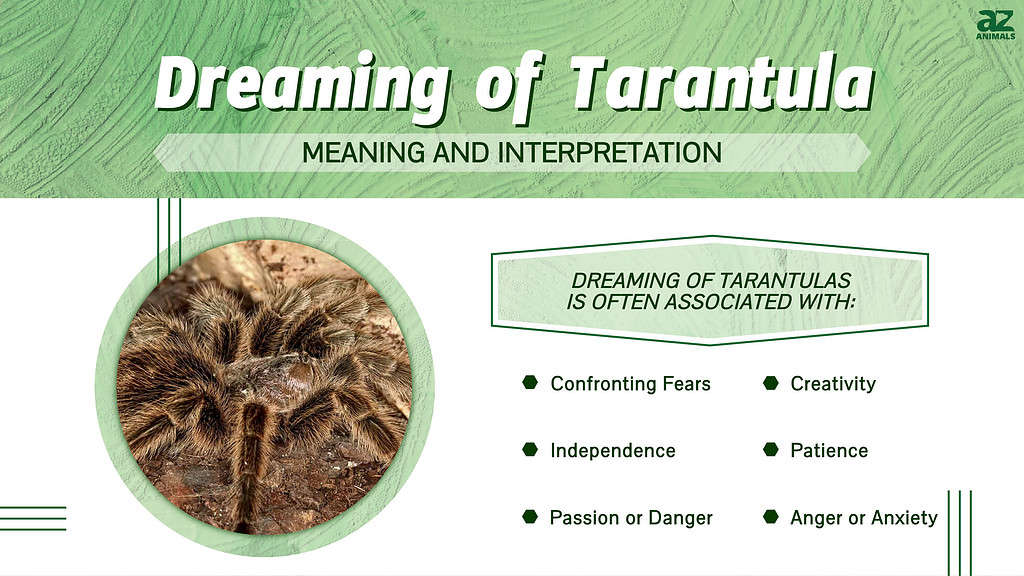
Dreaming of tarantulas can hold significant meaning as the spider represents creativity, patience, and power. The interpretation of tarantula symbolism and the feelings accompanying the dream can vary greatly depending on the individual’s experiences and cultural background. By exploring the symbolic meaning of tarantulas and the possible personal interpretations of the dream, we can gain insight into ways to approach our waking life with creativity, strength, and courage. discover the spiritual meaning and interpretation of dreaming of tarantulas.
Dreaming of Tarantulas

©Russell Marshall/Shutterstock.com
Dreaming of tarantulas can hold a range of meanings, depending on personal associations and cultural background. Generally speaking, tarantulas are associated with creativity, patience, and power, but in dreams, they can also be linked to fear, anxiety, or feeling trapped. Some interpretations suggest that a dream of tarantulas could be a sign of impending good luck, reminding us to be unique and independent, or warning against false friends who may betray us.
The specific interpretation of a tarantula dream will depend on individual circumstances and associations, and it is important to consider the dreamer’s own emotions and personal experiences when interpreting the dream.
How Can You Interpret Recurring Dreams Of Tarantula?
Recurring dreams of tarantulas may have different interpretations. Some theories suggest that it could be a symbol of suppressed anger or anxiety, and the tarantula may represent something that is bothering the dreamer but has not yet been confronted. It may also suggest that the dreamer needs to be patient and avoid impulsive behavior to achieve their goals, much like how a tarantula waits patiently for its prey.
Additionally, the dream could be interpreted as a warning against false friends or manipulation in relationships. It’s crucial to consider the dreamer’s personal experiences and emotional state when interpreting recurring dreams of tarantulas. Consulting with a qualified dream analyst or therapist may also provide additional insight.
How Can You Keep A Dream Journal To Track Recurring Tarantula Dreams?

Purple tarantulas are native to Ecuador in South America.
©Lukasz Kowalkowski/Shutterstock.com
Keeping a dream journal can be helpful in tracking recurring dreams of tarantulas. To begin, place a journal or notebook beside your bed and make a habit of writing down your dreams as soon as you wake up, including details such as any emotions or physical sensations experienced during the dream.
As you record your dreams over time, patterns or recurring symbolism may emerge, which can help you to interpret the dreams in the context of your individual experiences. Reflecting on the emotions and personal associations triggered by the dream can provide further insight into the potential meaning behind the dream and help you to identify any areas of your life that may need attention or reflection.
Are There Any Cultural Or Historical Significance Of Tarantulas In Dreams?
There are cultural and historical significances of tarantulas in dreams. In some Native American cultures, tarantulas are considered sacred, and a dream about them could represent the need to connect with one’s spiritual path. Certain cultures, including some African tribes, link tarantulas to fear and witchcraft. In Western culture, tarantulas could represent anxiety or feeling trapped. The interpretation of a dream involving tarantulas may vary depending on the dreamer’s cultural background and personal associations with the spider. It’s important to consider these factors when interpreting dreams about tarantulas.
Can The Color Of The Tarantula In The Dream Affect Its Interpretation?

Gooty Sapphire tarantulas are fast spiders, when they are observed as pets they skitter around their enclosures.
©Blake Frye/Shutterstock.com
Yes, the color of the tarantula in the dream could potentially affect its interpretation. Different colors can carry different symbolic meanings in dreams. For example, a black tarantula could be linked to fear or mystery, while a red tarantula could signify passion or danger. It’s important to consider any personal associations the dreamer has with specific colors and what those colors may represent in their life when interpreting the dream. Additionally, cultural meanings may also influence the interpretation of the color of the tarantula in the dream.
How Can You Use Tarantula Symbolism To Guide Your Waking Life?
Various interpretations of the symbolism of tarantulas exist. If you wish to use tarantula symbolism to guide your waking life, it may involve reflecting on any recurring themes that emerge in your dreams, as well as your own personal associations with the spider.
Depending on the interpretation, tarantula symbolism could offer insights into areas such as creativity, independence, patience, or the need to confront fears. Reflecting on the potential meaning of tarantula symbolism, taking note of any patterns or recurring themes, and using this information to guide your waking life may prove helpful.
Consulting with a qualified dream analyst or therapist to gain additional insight could also be an option.
What Are Some Ways To Invite Tarantula Energy Into Your Life?

Green bottle blue tarantula chromatopelma cyaneopubescens
©tempisch/Shutterstock.com
While tarantulas can carry symbolic meanings and lessons, they are also living creatures with their own natural behaviors and instincts. It’s crucial to respect their role in the ecosystem and not invite them into our lives in a way that could potentially be harmful to them. Displaying tarantula art in your space could be a safe and creative way to surround yourself with tarantula energy along with journaling about your tarantula dreams.
If you are experiencing fear or discomfort related to tarantulas, it may be more helpful to work on overcoming those feelings through therapy or other positive means of personal growth and development.
What Is Dream Therapy and How Can It Help With Tarantula Dreams?
Dream therapy is a type of therapy that involves exploring and interpreting the meanings of dreams to gain insight into a person’s subconscious thoughts and emotions. In the case of dreams about tarantulas, dream therapy can help individuals better understand the symbolism and underlying emotions associated with the tarantula, such as fear, anxiety, or feelings of being trapped.
A therapist or counselor trained in dream analysis can guide individuals through the process of interpreting their dreams and help them identify patterns or themes that may be present. Dream therapy can also provide a safe and supportive environment for individuals to express and process their emotions related to their tarantula dreams and work towards overcoming their fears.
In addition to dream therapy, seeking treatment for anxiety or phobias related to tarantulas may also be beneficial. This may include cognitive-behavioral therapy, exposure therapy, or other forms of psychotherapy. It’s important to remember that the effectiveness of any therapeutic approach can vary greatly depending on the individual and their specific experiences and needs.
Can Hypnosis Help With Tarantula Dreams?

Orange Baboon (Pterinochilus murinus) on peanuts
©Mark_Kostich/Shutterstock.com
While there is no definitive answer to whether hypnosis can specifically help with tarantula dreams, hypnotherapy has been used to treat anxiety and phobias related to a variety of things, including spiders. Hypnotherapy involves guided or self-directed relaxation, focused concentration, and suggestibility to help individuals overcome negative emotions and thoughts related to the phobia or fear.
If recurring tarantula dreams are causing significant distress or interfering with daily life, hypnotherapy may be a potential option to explore with a trained therapist, in addition to other forms of therapy such as dream analysis or cognitive-behavioral therapy. However, it’s important to note that the effectiveness of hypnotherapy or any therapeutic approach can vary greatly depending on the individual and their specific experiences and needs. It’s also worth noting that hypnotherapy should be conducted by a licensed professional with training and expertise in the field.
In Conclusion
In conclusion, interpreting dreams about tarantulas can be a personal and symbolic process that involves reflecting on cultural and personal meanings attached to these creatures. The color of the tarantula in the dream can potentially affect its interpretation, and patterns or recurring themes may emerge over time. Consulting with a qualified dream analyst or therapist may also be helpful.
While tarantulas can carry symbolic meanings, it’s essential to respect their role in the ecosystem and not invite them into our lives in a way that could harm them. Additionally, working on overcoming fear or discomfort related to tarantulas through positive personal growth and development can be more beneficial than inviting tarantula energy into one’s life.
The photo featured at the top of this post is © Photo Spirit/Shutterstock.com
Thank you for reading! Have some feedback for us? Contact the AZ Animals editorial team.






